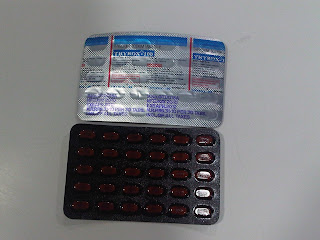Levothyroxine
SYNTHROID
(LEVOTHYROXINE)
Synthroid
Information
Synthroid is
a drug whose main ingredient, Levothyroxine, is naturally a hormone produced by
the thyroid gland, and it is mainly used in cases where the thyroid gland of
the patient cannot produce the sufficient quantities of hormone the human body
requires. Apart from its hormone deficiency usage, Synthroid is also commonly
prescribed for the treatment of goiter (unusual enlargement of the thyroidal
gland), of thyroid cancer and can also be prescribed for other
affections.
Synthroid Indications
Synthroid is
mainly prescribed for the treatment of patients suffering from thyroid hormone
insufficiency, patients with unusual enlargement of the thyroid gland (goiter)
or patients with thyroid cancer. There may be other uses for this drug, so
if you have questions about why have you been prescribed Synthroid, please
consult your personal health care specialist.
Synthroid Warnings
Always talk
to your personal health care specialist before starting Synthroid treatment and
let him or her know about your medical history. Some conditions may require an
altered dosage or may prevent you entirely from starting out the treatment,
such as:
·
Diabetes Mellitus
·
Hardening of the arteries
·
Heart disease
·
High blood pressure
·
Overactive Thyroid
·
Under active adrenal glands
·
Under active pituitary glands
Other
conditions may require special attention or monitoring during treatment, so it
is advised you should consult with your personal physician prior to beginning
Synthroid treatment. Special precautions are also advised to be taken if you
have an allergy to hormones. Studies have not yet shown Synthroid to have any
side effects on pregnancy and breast feeding, however, if you are a nursing
mother, if you are pregnant or planning to become soon it is best that you
first consult your personal health care specialist before starting treatment
with Synthroid.
You should
consult your personal health care specialist for a detailed list of Synthroid
intake guidelines. If you have trouble understanding any of the directions, ask
a doctor, pharmacist or nurse to help clarify them. It is advised that you
never alter your drug intake schedule, either by changing the dosage or the
time intervals between intakes.
Synthroid Dosage
Synthroid
comes in two forms, tablets and vials for injection. For each of them there is
separate dosage, so it is best that you consult your personal physician before
starting treatment with this drug. Here are some general guidelines: For
tablets, the general adult dosage of this drug is 0.0125 to 0.05 mg once per day,
going up to 0.075 – 0.125 mg per day. It is recommended that the dosage should
never exceed 0.15 mg per day. Dosage in children largely depends in age and
body weight, ranging anywhere between 0.025 and 0.2 mg per day, but should not
exceed the adult dosage.
For
injection, the adult normal dose of Synthroid is of around 50-100 mg once per
day, to be injected either into a muscle or a vein. The dosage for children
largely depends on age and body weight, and can be set by your personal health
care specialist anywhere between 0.019 and 0.15 mg once per day. People with
severe cases of thyroid gland problems can expect the doses to be larger,
depending on the doctor's opinion.
IMPORTANT! Do
not self medicate. Always check with your personal health care specialist
before starting your treatment to get a precise dosage, intake guidelines and
schedule and follow them closely. Failing to do so will greatly increase the
risk of side effects and complications to appear, and these can have grave,
sometimes even lethal consequences.
Synthroid Overdose
Tests have
not yet concluded what the symptoms of Synthroid overdose are. If you have
reasons to believe you are suffering from an overdose with this drug, it is
recommended that you contact your personal health care specialist right away or
go to the nearest hospital to seek emergency medical attention.
Synthroid Missed Dose
It is advised
that you follow the intake dosage and time schedule your personal health care
specialist has provided. However, should you happen to miss a Synthroid dose it
is best to take it as soon as you remember, unless it is almost time for
another dose. If it is almost time for another dose, skip that dose entirely
and continue with your regular schedule. Never take another dose to make up for
the lost one.
Synthroid Side Effects
There have
not been any cases of Synthroid side effects, either in adult patients or in
children. Using the proper dosage and intake schedule, Synthroid works normally
and without the risk of any side effects occurring. Should you experience any
unpleasant, unwanted results while following treatment with this drug, contact
your health care specialist at once to further investigate and establish the
causes and set an appropriate course of action to follow.
Synthroid Drug Reactions
Some other
drugs found on the market can interact with Synthroid. Special attention must
be employed if you are taking any of the following:
·
Amphetamines
·
Anticoagulants
·
Appetite suppressants
·
Cholestyramine
·
Colestipol
·
Medicines for asthma or drugs prescribed to treat breathing
problems
·
Medicines intended for colds, sinus problems and allergies (such
as hay fever). Also includes nose drops or nasal sprays.
There may be
other drugs that Synthroid interacts with and are not in this list. It is
advised that you consult with your personal health care specialist about all
the drugs, minerals, vitamins and nutritional supplements you are currently
taking before starting a treatment with Synthroid.
Buy Synthroid
Buy Synthroid
through our Online Pharmacy or at any Canada Pharmacy selling Online
Prescriptions.
Corion (High Purity Hcg) Drug
Reactions
You should ask your personal physician if it is safe to start
taking other medicines while being treated with Corion (High Purity Hcg).
Buy Levothyroxine Hormones Medicine From
Fast Escrow Refills (www.fastescrowrefills.net) Using Coupon Code: FAST0005 to Get
10% Discounts





0 comments:
Post a Comment